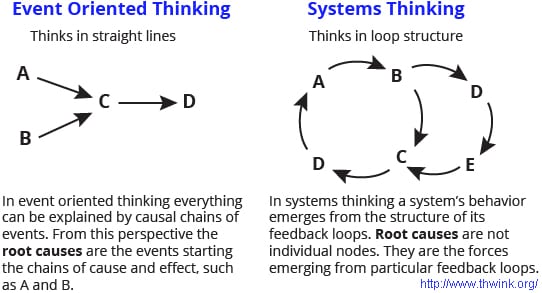Download Episode Here – right click link and select “Save Link As…”
In this episode, Joel and Antonia talk about systems thinking. They reject the notion of cause and effect and instead posit the idea that everything is an emergent property of a system.
In this podcast on Systems Thinking and the Illusion of Cause-and-Effect you’ll find:
- There is no such thing as Cause and Effect but only “Emergent Properties of Systems”
- Systems Thinking is a way of thinking or interacting with reality that is different from basic Cause and Effect.
- When we try to create influenced results, we end up having limited influence over it because we are not seeing the other Influencers or Nodes in the system.
- To have a desired result, recognize that nodes have to work in a certain way to have an “emergent” (thing that emerges from all things working together).
- We turn to Cause and Effect thinking because things are too complex to understand and because it is easier to fuse Sequential events.
- A System is a cluster of themes working together influencing each other; doing things synchronously and asynchronously and brings about an inevitable emergent.
- Two things to keep in mind about systems:
- Initial Condition (starting condition of a system)
- How the nodes in the system interact with each other
- Systems thinking is more accurate than Cause and Effect thinking. It improves relationships and gives more favorable results.
- Raymond Kurzweil’s Theory of Singularity states that Technology doubles in an exponential growth curve. Singularity is the time period where technology is doubling too fast to observe.
- The value of node connections is going up while the cost of information is lowering down.
- Intuition is needed now more than ever to figure which systems to work on, how systems are working and how to manage information.
- Gregory Bateson (Author, Steps to an Ecology of Mind) states “Systems are delicate. We don’t see them so we break them”.
Things we reference in this podcast:
To subscribe to the podcast, please use the links below:
Subscribe with iTunes
Non iTunes Link
Download The Android App
Subscribe on Soundcloud
Subscribe with Stitcher
If you like the podcast and want to help us out in return, please leave an honest rating and review on iTunes by clicking here. It will help the show and its ranking in iTunes immensely! We would be eternally grateful!
Want to learn more?
Discover Your Personal Genius
We want to hear from you. Leave your comments below…


Share:
Podcast - Episode 0038 - Personality Types in Personal Development
Podcast - Episode 0040 - Growth and Transitions
19 comments
Definitely! It would be really cool see a list of sci-fi books and movies of any/all genres that are examples of systems thinking in action.
A
Great podcast! Uhm this creates a paradox in my mind.
If every component of a system is 100% responsible for the system to work (like the example of moving the car from FL to AK) how is it possible that some nodes are more important than others? (80/20 principle)
Or maybe the 80/20 principle is referring to the MINIMUM amount of nodes needed to create an emergent?
Hi, guys! Just wanted to say a quick thanks for your podcasts and articles. I find your talks absolutely delicious to my brain, its like a breath of fresh air after spending a day in a cramped classroom full of people. I am an intuitive and i have always been very different and little wierd so i have felt marginalization for most of my life until i learned to realy own my w̶e̶i̶r̶d̶n̶e̶s̶s awesomeness. I dont feel marginalized anymore, but i still find it rather hard to connect to people around me. I believe its because vast majority of people in my life are sensors. And because it is vitaly important to me to share and connect with someone, i am wondering how can i connect to sensors. Im also wondering how does a connection feel to sensors and what triggers it. For example, i expierience feeling of connection with someone when im discussing things that i have a passion for, things that are dear to me and why do ceartain things make me feel a certain way. It seems to me that sensors are not so open about sharing that sort of thing or maybe they just dont care about that as much. Maybe sensors feel more connected when they can share their opinion about developement of relationships or future aspirations (career plans or long term household improvement – something more easily observable). Or maybe im wrong and it doesnt have anything to do with being sensor/intuitive? I real y want to figure this out, any tips will be much appreciated.
Some of the best systems thinkers, and ‘ecological’ thinkers, are actually science fiction writers, and the great filmmakers! I’d say that great architects also make superb systems/ecological thinkers!